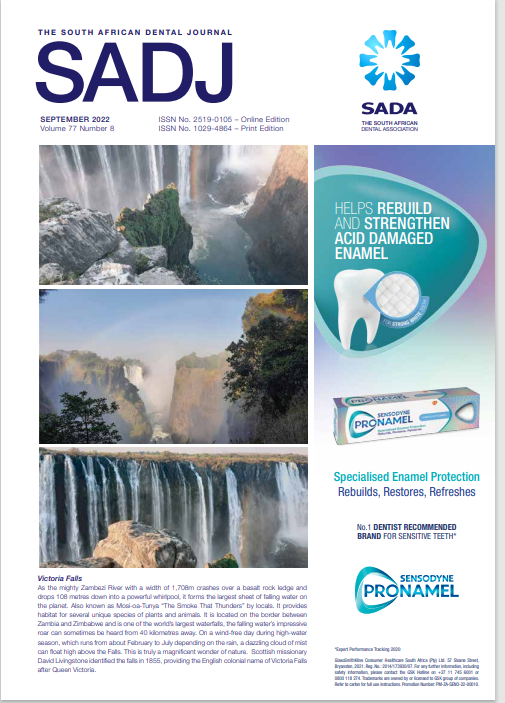To extract or not to extract – Felicific calculus to the rescue
DOI:
https://doi.org/10.17159/2519-0105/2022/v77no8a9Keywords:
utilitarianism, hedonism, felicific calculus, dental extraction, ethics, shared decision-makingAbstract
Contestations about the most appropriate clinical intervention and preferred treatment modality remains a serious challenge in dental practice. Dentists must straddle a delicate line between coercion, medicalpaternalism and respecting patient’s interests and
concerns. This paper explores a moral debate using a dental extraction case study, and felicific calculus as a tool for joint decision-making. We argue that this instrument offers an invaluable opportunity for building rapport and mutual engagement. Additionally, recognition of patient’s preferences must also be considered in the proposed clinical intervention to inculcate a sense of ownership of
the interventions proposed for and by the patient. It is argued that, this will instill a sense of shared-decision making in the interaction between the patient and the clinician.
Downloads
References
Lesolang, R., Motloba, D. & Lalloo, R. Patterns and reasons for tooth extraction at the Winterveldt Clinic: 1998-2002: Scientific. South African Dental Journal 64, 214-218 (2009).
Mayosi, B. M. et al. Health in South Africa: changes and challenges since 2009. The Lancet 380, 2029-2043 (2012).
Watt, J. Needless extractions? British Dental Journal 197, 170-170, doi:10.1038/sj.bdj.4811607 (2004).
Broers, D. L. M., Brands, W. G., Welie, J. V. M. & de Jongh, A. Deciding about patients' requests for extraction. The Journal of the American
Dental Association 141, 195-203, doi:https://doi.org/10.14219/jada.archive.2010.0139 (2010).
Friedling, L. J. & Morris, A. G. Pulling teeth for fashion: dental modification in modern day Cape Town, South Africa. Sadj 62, 106, 108-113 (2007).
Sosa, D. Consequences of consequentialism. Mind 102, 101-122 (1993).
Bentham, J. The greatest happiness of the greatest number. Bentham’s political thought, 309-310 (1830).
Honderich, T. Consequentialism, moralities of concern, and selfishness. Philosophy 71, 499-520 (1996).
Hall, J. C. Quantity of Pleasure. Proceedings of the ETHICS < 507Aristotelian Society 67, 35-52 (1966).
Mitchell, W. C. Bentham's Felicific Calculus. Political Science Quarterly 33, 161-183 (1918).
Pavel, M. S., Chakrabarty, S. & Gow, J. Assessing willingness to pay for health care quality improvements. BMC Health Services Research 15,
, doi:10.1186/s12913-015-0678-6 (2015).
Broers, D. L. M., Dubois, L., de Lange, J., Su, N. & de Jongh, A. Reasons for Tooth Removal in Adults: A Systematic Review. International Dental Journal 72, 52-57, doi:https://doi.org/10.1016/j.identj.2021.01.011 (2022).
Broers, D. L. M. et al. Financial, psychological, or cultural reasons for extracting healthy or restorable teeth. The Journal of the American Dental Association, doi:https://doi.org/10.1016/j.adaj.2022.01.008 (2022).
Casamassimo, P. S., Thikkurissy, S., Edelstein, B. L. & Maiorini, E. Beyond the dmft: the human and economic cost of early childhood caries. The Journal of the American Dental Association 140, 650-657 (2009).
Kitcher, P. Kant's argument for the categorical imperative. Noûs 38, 555-584 (2004).
Warnock, M. Informed consent--a publisher's duty. British Medical Journal 316, 1002-1002 (1998).
Bukstein, D. A. Patient adherence and effective communication. Annals of Allergy, Asthma & Immunology 117, 613-619 (2016).
Downloads
Published
Issue
Section
License

This work is licensed under a Creative Commons Attribution-NonCommercial 4.0 International License.






.png)